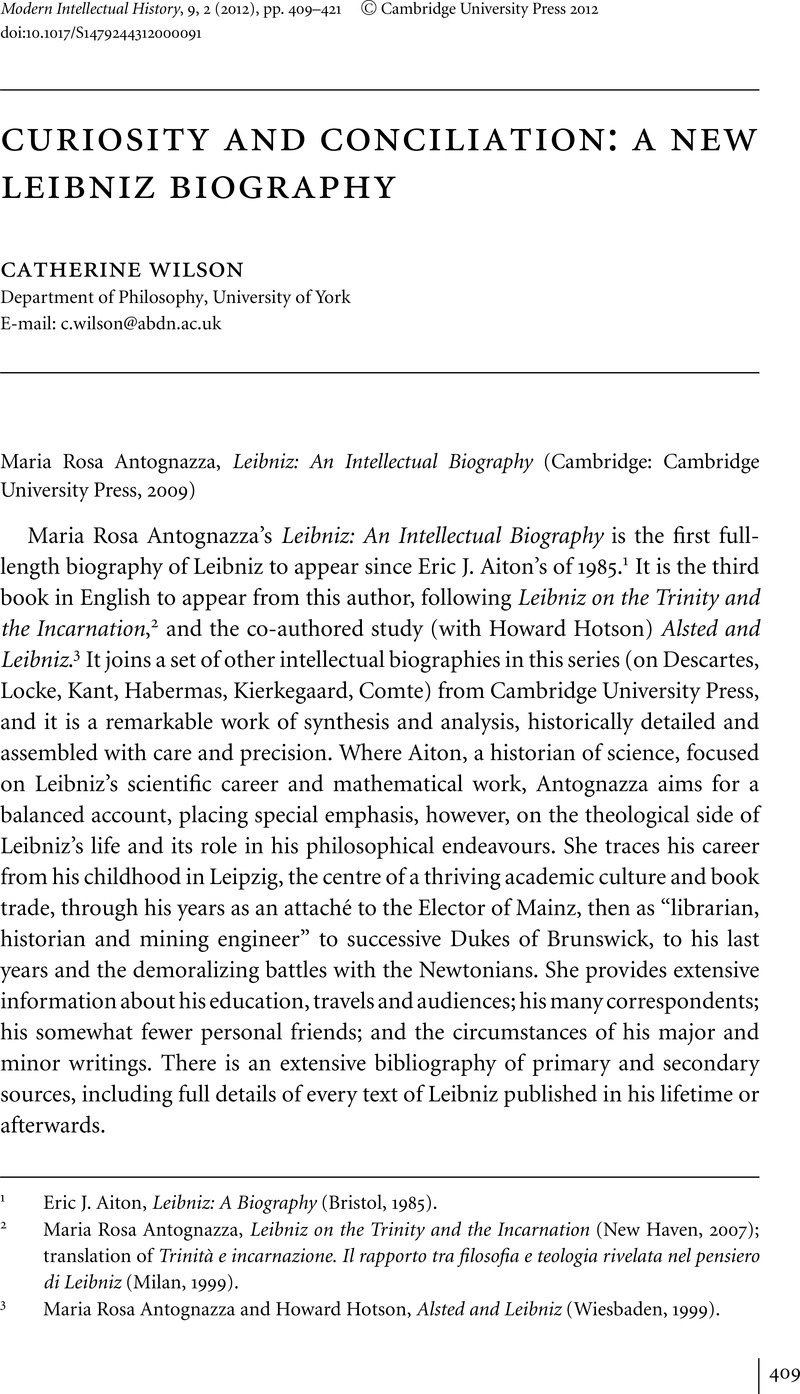No CrossRef data available.
Published online by Cambridge University Press: 10 July 2012

1 Aiton, Eric J., Leibniz: A Biography (Bristol, 1985)Google Scholar.
2 Antognazza, Maria Rosa, Leibniz on the Trinity and the Incarnation (New Haven, 2007)Google Scholar; translation of Trinità e incarnazione. Il rapporto tra filosofia e teologia rivelata nel pensiero di Leibniz (Milan, 1999).
3 Antognazza, Maria Rosa and Hotson, Howard, Alsted and Leibniz (Wiesbaden, 1999)Google Scholar.
4 Williams, Bernard, “Integrity,” in Williams, Bernard and Smart, J. J. C., Utilitarianism: For and Against (Cambridge, 1973), 108–17Google Scholar.
5 Müller, Kurt and Krönert, Gisela, Leben und Werk von Gottfried Wilhelm Leibniz: Eine Chronik (Frankfurt am Main, 1969)Google Scholar.
6 Rutherford, Donald, “Salvation as a State of Mind: The Place of Acquiescientia in Spinoza's Ethics,” British Journal for the History of Philosophy 7/3 (1999), 447–73CrossRefGoogle Scholar.
7 Goldmann, Lucien, The Hidden God: A Study of Tragic Vision in the Pensées of Pascal and the Tragedies of Racine (Atlantic Highlands, NJ, 1964), 53–4Google Scholar.
8 Brown, Stuart, “Leibniz's Formative Years (1646–76),” in idem, ed., The Young Leibniz and His Philosophy (1646–76) (New York, 1999), 1–18CrossRefGoogle Scholar; Mercer, Christia, Leibniz's Metaphysics: Its Origins and Development (Cambridge, 2001)CrossRefGoogle Scholar. Sleigh, Robert and Mercer, Christia, “Metaphysics: The Early Period to the Discourse on Metaphysics,” in Jolley, N., ed., The Cambridge Companion to Leibniz (Cambridge, 1995), 67–123Google Scholar.
9 Garber, Daniel, Leibniz: Body, Substance, Monad (Oxford, 2009)CrossRefGoogle Scholar.
10 Wilson, Catherine, Leibniz's Metaphysics: A Comparative and Historical Study (Princeton and Manchester, 1989)Google Scholar; Hartz, Glenn and Wilson, Catherine, “Ideas and Animals: The Hard Problem in Leibniz's Metaphysics,” Studia Leibnitiana 37 (2006), 1–23Google Scholar.
11 Veyne, Paul, Did the Greeks Believe in Their Myths (Chicago, 1988)Google Scholar.
12 Hunter, Ian, “Leibniz's Political Metaphysics,” chap. 3 of idem, Rival Enlightenments: Civil and Metaphysical Philosophy in Early Modern Germany (Cambridge, 2001), 95–147CrossRefGoogle Scholar.
13 On Platonism as the unifying theme in Leibniz's metaphysics see Mercer, Leibniz's Metaphysics.
14 Duchesneau, François, Leibniz, le vivant et l'organisme (Paris, 2010)Google Scholar.
15 Williams, “Integrity,” 116–17, original emphasis.